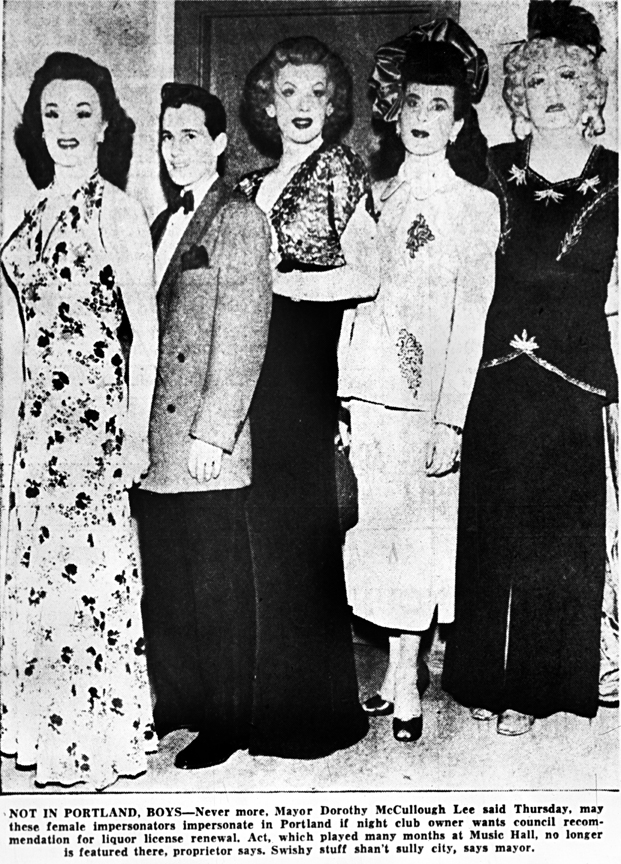This photograph of cross-dressing performers at Portland's Music Hall ran on the first page of the May 17, 1950, edition of the Oregon Journal. Large populations of single people living away from their hometowns moved to and through Portland as service personnel and war industry workers during World War II, and bars and taverns with gay and lesbian clienteles thrived as a result. After the war, Police investigated bars and taverns where gays and lesbians congregated. Mayor Dorothy McCullough Lee (1949-1953) was particularly virulent in her attacks on gay establishments, especially the Music Hall.
The crusading attitude against what many saw as deviant behavior was so popular that Lee's challenger in the 1952 mayoral election accused her of not doing enough to "afford protection to little children from vicious sex criminals now roaming the streets of Portland." Stories in the local media reflected and promoted the conflation of homosexuality with pedophilia. The Oregon Journal, for example, ran a series in 1954 and 1960, using the term "sex deviates," to refer to homosexual people.
Gay, lesbian, bisexual, and transgender people fought discrimination in their communities. During the 1950s, many formed homophile organizations on the West Coast to promote the acceptance and assimilation of homosexuals by and into mainstream society. No one in Portland formed an organization, but a few citizens occasionally distributed publications of homophile groups, including ONE and the Mattachine Review. The modern gay-rights movement, focused on pride and the search for civil rights, emerged nationwide and in Portland following the Stonewall riots of 1969.
During the 1950s and 1960s, police in cities across the United States made frequent raids on gay-friendly bars and nightclubs, often recording the identities of those present and citing them for "indecency." On June 28, 1969, a raid by New York police on a gay bar, the Stonewall Inn, resulted in a fight between thousands of members of the gay community and hundreds of police officers. That event, often referred to simply as "Stonewall," is widely credited with beginning the modern gay rights movement, which resulted in attempts to provide legal protection for gay and lesbian people across the nation, including Oregon.
Further reading:
Peter Boag, " 'Does Portland Need a Homophile Society?': Gay Culture and Activism in the Rose City between World War II and Stonewall" Oregon Historical Quarterly 105:1 (Spring 2004): 6-39.
John D'Emilio, Sexual Politics, Sexual Communities: The Making of a Homosexual Minority in the United States, 1940-1970 (Chicago: University of Chicago Press, 1983).
Written by Eliza Canty-Jones, © Oregon Historical Society, 2007.
